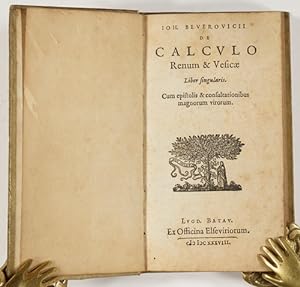Beschreibung
Leyden, Elsevir, 1638, 12°, (16), 305, (15) pp., Pergamenteinband der Zeit; feines Exemplar. First Medical Treatise to contain an Endorsement of Harvey's Discovery! The rare first edition of Johan van Beverwijck's (1594-1647) monograph present in the first book (pp. 1-208) Beverwijck's treatise on calculi in the kidney and bladder. The second part (pp. 209-305) contains letters addressed by Beverwijck to some prominent physicians, including Nuñez, Back, Saumaise, and Zacuto whom he consulted on that subject, along with their replies. Several consilia by Sanctorius, Spiegel, Horst, and others follow. At the end of 1637 Beverwyck wrote a letter to Harvey in which he expressed his admiration for Harvey's discovery of blood circulation. At the same time he sent him a copy of the present book. It is the first medical treatise to contain an endorsement of Harvey's discovery, a remarkable fact in view of the negative attitude within the academic circles in Holland. The passage in question "Harvei doctrina de Circulatione sanguinus comprobata" (pp.20-24) is discussed by Walter Pagel in his William Harvey's Biological Ideas (1967), who reproduces the title-page of our book and two pages of the passage on Harvey. Harvey replied to Beverwijck's letter in April 1638, praising his book as "learned and elegant, and truly original." Osler notes the significance of Beverwyck's correspondence with Harvey but was unable to obtain a copy of this rare book. Beverwijck , was born in Dordrecht on 17 November 1594. He was the son of Bartholomeus van Beverwijck ( -1615), a textile trader, and Maria Boot van Wezel, a relative of Vesalius. On 25 May 1611 he matriculated at Leiden University to study arts and philosophy but switched to medicine He is said to have taken his doctoral degree with a disputation on apoplexy, but this almost certainly refers to a disputatio exercitii gratia, a public or private disputation meant as an exercise (see Lindeboom, 128). In 1615 Van Beverwijck and Cornelis van Someren (1593-1649) travelled to Caen, Paris, Orléans, Montpellier and Avignon. He also visited Rome and Siena. Meanwhile in this last town he contracted the plague. Van Beverwijck also visited Bologna and Padua, where he entered the university as a student of medicine on 14 May 1616. Under the supervision of Hieronymus Fabricius ab Aquapendente (1537-1619) he graduated on a disputation on the 79th Aphorism of book IV (De calculo) of Hippocrates. On his return journey he visited Basle and Leuven (Louvain) in the company of a Dutch physician called Buggen. In Dordrecht Van Beverwijck set up a medical practice. On 8 November 1625 he was appointed town physician of Dordrecht in succession to Jorden van Foreest (1568-1625). On 25 October 1634 Van Beverwijck inaugurated the anatomical theatre of Dordrecht with a speech on the necessity of anatomy with the "Oratie van de nootsakelickheyt der anatomie" (1634). He also became professor of medicine and anatomy at the Illustrious School (founded 1635) as well as librarian (since 1636) and administrator (1648) of the municipal library in succession to Jacob Cats (1577-1660). Van Beverwijck was a prolific writer, publishing several books on practical medicine in Dutch, like Schat der gesontheyt (1635-1636) and Schat der ongesontheyt ofte genees-konste van de sieckten (1642), as well as literary works (Spaensche Xerxes, 1640) and essays on historical topics ('t Begin van Hollant in Dordrecht, 1640). In 1639 Van Beverwijck published Van de wtnementheyt des vrouvvelicken geslachts, a collection of texts (prose and poetry) in praise of (famous) women. In 1644 he also published Epistolicae quaestiones, a work on several popular subjects containing the answers of great men. Van Beverwijck's friends include a wide range of intellectuals, like Sir Kenelm Digby (1603-1655), Constantijn Huygens, Menasseh ben Israel (1604-1657) and Anna Maria van Schurman (1607-1678). Epistolica quaestio de vitae . Bestandsnummer des Verkäufers 42587
Verkäufer kontaktieren
Diesen Artikel melden
![]()

